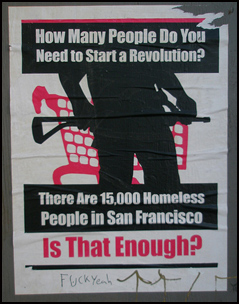
As in the days of Les Miserables, people who lack wealth or property tend to be marginalized, disenfranchised, and dehumanized. Last week — and nothing has changed since then — House the Homeless discussed how, in America, poverty and homelessness are no longer lifestyles experienced chiefly by members of minority groups. Sure, ancestry is a factor in human fate, but almost always, the ultimate measuring device is money.
Recently, Northern California’s “Armstrong & Getty” radio show included the on-air reading of an email from homeless activist Ace Backwords. Here is an excerpt:
I’ve also been homeless for about 10 years… I’ve worked and supported myself for most of my life, including while I was homeless, and rarely went to the free meals or used the social services…
You see only the most grotesque and obvious members of the homeless community… The ones you don’t notice are the millions of otherwise normal people who don’t look or act homeless (which is why you don’t notice them) but just happen to be homeless. This is especially true of the latest generation of homeless — the ones in their 20s and 30s. A good percentage of them, there’s nothing particularly ‘street’ about them. They’re just normal people who got priced out of the rental market or victimized by the economic downturn. I read somewhere that 50% of recent college graduates are unemployed. And a surprising number of them end up homeless.
Whatever the percentage, isn’t it kind of shocking that any percentage of college graduates are unemployed? When even the educated white folks start finding themselves in the bread line, the situation is serious!
We also talked last week about Richard R. Troxell’s reflections on the book Why We Can’t Wait, by Dr. Martin Luther King, Jr., which was published in 1963 — almost 50 years, or half a century ago. Drawing a parallel between black Americans in the past and many people of all races in the present, Richard wrote:
… [W]ages can still be correctly characterized as slave wages as they are today even though they are set by the federal government itself. This is the case today with the federal minimum wage being set at so low a level that it leaves a full time worker firmly impoverished and unable to afford life’s basic necessities… Today, American business remains unwilling to relinquish what still amounts to a vast human reservoir of cheap labor paid at poverty wages that continues to economically enslave workers.
Part of the problem here is the “one size fits all” assumption on which the federal minimum wage is based. As Richard says, America is a nation of a thousand economies, at least. In different regions, the minimum wage needs to be different. The Universal Living Wage would go a long way toward rectifying matters.
Nicole Hudley of New America Media relates how California’s Homeless Youth Project (HYP) is trying to get a handle on the extent of the problem, as represented by raw numbers. To understand how they cope, the HYP also surveyed 200 young people, both black and white, on the streets of San Francisco. The researchers learned that while white kids are more apt to sign in at shelters, black kids are more likely to find makeshift solutions like sleeping on buses or in fast food restaurants.
Hudley writes:
The African American youth were 38 percent more likely to be placed in the foster care system by Child Protective Services than whites. African American young people were also more likely to attribute family conflict to temporary problems associated with such issues as finances or substance abuse. Whites, on the other hand, often viewed their family trouble as being permanent and irresolvable.
Perhaps this is why African American youths who succeed in eluding the foster system are less likely to call themselves homeless, because many of them manage to patch together a series of temporary semi-homes. They get more support from extended family and friends, often “couch-surfing” from one place to another and using their food stamp allotments to pay back the favor. While not, technically, the same as absolute homelessness, this mode of survival is certainly “unstable housing” and needs to be recognized as equally problematic.
The poor of all ethnic groups share in common the feedback loop between homelessness and jail and homelessness and jail, and so on. Using prisoners for slave labor is actually fine, according to the Constitution. It says so right there in the 13th Amendment, as “Jehu” reminds us. This writer also notes that anti-vagabond laws were often used in the previous century to collect black men from the streets so they could be forced to work on behalf of corporate interests for no pay.
Jehu quotes a political author named Carl V. Harris:
In 1906 the editor of the Birmingham News said: ‘Anyone visiting a Southern city or town must be impressed at witnessing the large number of loafing negroes… They can all get work, but they don’t want to work. The result is that they sooner or later get into mischief or commit crimes.’ The editor believed that such Negroes were ‘not only a menace to the public safety’ but also ‘to some extent a financial burden upon the taxpayers.’
Doesn’t that sound just like what is said of people experiencing homelessness in the present day? Unlike the American South of over a hundred years ago, where black people were demonized, we now have an entire country where anyone can be demonized, regardless of race, creed, or whatever. All they have to be is homeless. This is equality like never before — progress indeed. And yes, that was a sarcastic remark.
Reactions?
Source: “The Armstrong and Getty radio show,” Acid Heroes, 12/14/12
Source: “Homeless Black Youth Largely Invisible to Service Providers,” New America Media, 01/03/13
Source: “A critical examination of Kevin Carson’s Mutualism (Part One),” Gonzo Times, 06/09/11
Image by D.C. Atty.0


